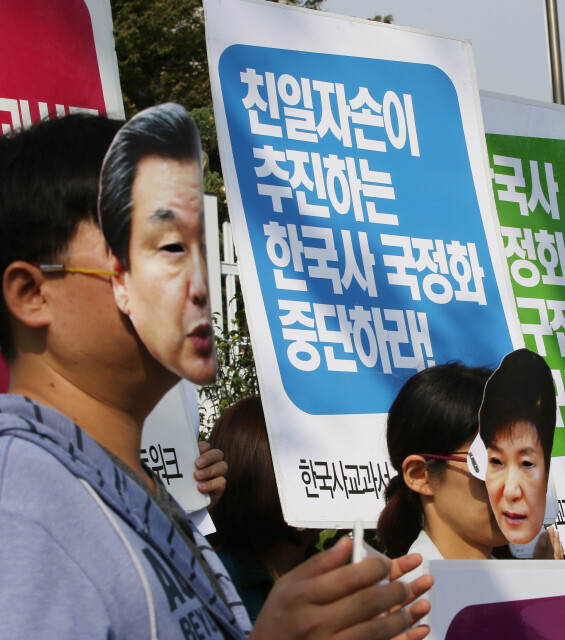hankyoreh
Links to other country sites 다른 나라 사이트 링크
Official announcement of single history textbook expected next week

Ignoring fervent resistance from the opposition party and voices in the media, the current administration has aligned with the ruling Saenuri Party (NFP) to enforce the implementation of a single history textbook in South Korean schools. The Ministry of Education (MOE) is expected to officially announce this change sometime around Oct. 12 or 13. Voices in opposition are calling the policy a step backwards, contrary to global trends.
On Oct. 7, when reporters asked Saenuri Party floor leader Won Yoo-cheol at the National Assembly if the government was going to adopt a single textbook on Oct. 13, he replied that “it appears so,” providing a de-facto confirmation of the policy. “The case for a single state history textbook is clear, and it’s the responsibility of the Ministry of Education to lead the transition,” said Cho Won-jin, the party’s floor leader. It’s been reported that the current administration and ruling party are discussing a measure to change the text’s official name to “single Korean history textbook.”
On the same day, a source from the Blue House revealed that the administration’s final stance is that the Ministry of Education needs to implement a policy reform to develop a history textbook that‘s “factually based and balanced,” referring to statements made by President Park on the issue back in February.
Voices from in and outside political circles are hinting that the MOE will likely announce its decision in alignment with the conclusion of the National Assembly audit sessions on Oct. 12 or the beginning of State Council meetings on Oct. 13.
Many are calling the concept of a state history textbook regressive and anachronistic. The censorship of history that occurred under the Japanese occupation was merely replaced by the state-sponsored history of the Yushin era (Park Chung-hee administration). Following democratization, history books managed to remain free of state censorship until 2011, when state-authorized textbooks on Korean history were introduced for high-school students. The current administration and ruling party have not rectified this system by introducing legislation to allow schools to freely select textbooks, nor have they offered a fair curriculum. On the contrary, they’re turning the wheels of historical progression backwards.
Today, the only countries that use state textbooks in public schools are North Korea and Bangladesh, along with a few Islamic theocracies. Other than that, there are countries with private sectors that are too poor to publish textbooks, countries dealing with civil war, and a few dictatorships. Among the 34 member countries in the Organisation for Economic Cooperation and Development (OECD), 17 of them allows schools to freely select their curriculum, while seven administer a standard curriculum. Thirteen countries requires a certification process, but among them, only Mexico and Turkey require such authorizations for elementary school, while middle and high schools employ a mix of free selection and state authorization.
In the United States, a group of Korean-Americans have gathered to form a petition in opposition to South Korea‘s single state history textbooks, claiming that state-authorized textbooks are a figment of “Nazi Germany, imperial Japan, and Yushin-era South Korea.” They say that the country will become the laughing stock of the global community if it goes through with the program, and are seriously worried the current administration will damage the country’s international image.
By Kim Kyung-wook and Jeon Jung-yoon, staff reporters
Please direct questions or comments to [english@hani.co.kr]

Editorial・opinion
![[Column] Park Geun-hye déjà vu in Yoon Suk-yeol [Column] Park Geun-hye déjà vu in Yoon Suk-yeol](https://flexible.img.hani.co.kr/flexible/normal/500/300/imgdb/original/2024/0424/651713945113788.jpg) [Column] Park Geun-hye déjà vu in Yoon Suk-yeol
[Column] Park Geun-hye déjà vu in Yoon Suk-yeol![[Editorial] New weight of N. Korea’s nuclear threats makes dialogue all the more urgent [Editorial] New weight of N. Korea’s nuclear threats makes dialogue all the more urgent](https://flexible.img.hani.co.kr/flexible/normal/500/300/imgdb/original/2024/0424/7317139454662664.jpg) [Editorial] New weight of N. Korea’s nuclear threats makes dialogue all the more urgent
[Editorial] New weight of N. Korea’s nuclear threats makes dialogue all the more urgent- [Guest essay] The real reason Korea’s new right wants to dub Rhee a founding father
- [Column] ‘Choson’: Is it time we start referring to N. Korea in its own terms?
- [Editorial] Japan’s rewriting of history with Korea has gone too far
- [Column] The president’s questionable capacity for dialogue
- [Column] Are chaebol firms just pizza pies for families to divvy up as they please?
- [Column] Has Korea, too, crossed the Rubicon on China?
- [Correspondent’s column] In Japan’s alliance with US, echoes of its past alliances with UK
- [Editorial] Does Yoon think the Korean public is wrong?
Most viewed articles
- 1[Column] Park Geun-hye déjà vu in Yoon Suk-yeol
- 2Thursday to mark start of resignations by senior doctors amid standoff with government
- 3Kim Jong-un expressed ‘satisfaction’ with nuclear counterstrike drill directed at South
- 4[Column] ‘Choson’: Is it time we start referring to N. Korea in its own terms?
- 5N. Korean hackers breached 10 defense contractors in South for months, police say
- 6Will NewJeans end up collateral damage in internal feud at K-pop juggernaut Hybe?
- 7Why Korea shouldn’t welcome Japan’s newly beefed up defense cooperation with US
- 8[Editorial] New weight of N. Korea’s nuclear threats makes dialogue all the more urgent
- 9[Guest essay] The real reason Korea’s new right wants to dub Rhee a founding father
- 10[Column] Yoon’s first 100 days should open our eyes to pitfalls of presidential system